|
[ October 2009 ] | |
|
| |
|
|







|
|
TCHS 4O 2000 [4o's nonsense] alvinny [2] - csq - edchong jenming - joseph - law meepok - mingqi - pea pengkian [2] - qwergopot - woof xinghao - zhengyu HCJC 01S60 [understated sixzero] andy - edwin - jack jiaqi - peter - rex serena SAF 21SA khenghui - jiaming - jinrui [2] ritchie - vicknesh - zhenhao Others Lwei [2] - shaowei - website links - Alien Loves Predator BloggerSG Cute Overload! Cyanide and Happiness Daily Bunny Hamleto Hattrick Magic: The Gathering The Onion The Order of the Stick Perry Bible Fellowship PvP Online Soccernet Sluggy Freelance The Students' Sketchpad Talk Rock Talking Cock.com Tom the Dancing Bug Wikipedia Wulffmorgenthaler |
|
bert's blog v1.21 Powered by glolg Programmed with Perl 5.6.1 on Apache/1.3.27 (Red Hat Linux) best viewed at 1024 x 768 resolution on Internet Explorer 6.0+ or Mozilla Firefox 1.5+ today's page views: 63 (18 mobile) all-time page views: 3401228 most viewed entry: 18739 views most commented entry: 14 comments number of entries: 1228 page created Mon Jul 14, 2025 05:11:22 |
|
- tagcloud - academics [70] art [8] changelog [49] current events [36] cute stuff [12] gaming [11] music [8] outings [16] philosophy [10] poetry [4] programming [15] rants [5] reviews [8] sport [37] travel [19] work [3] miscellaneous [75] |
|
- category tags - academics art changelog current events cute stuff gaming miscellaneous music outings philosophy poetry programming rants reviews sport travel work tags in total: 386 |

| ||
|
Caught up on clearing my module projects these days; the chickens have come home to roost. As a consolation, they usually are delectable after the fact. Just managed to complete my part for the Database module (which didn't get off to the best of starts, when I took some time to figure out that I had JRE but not JDK on my home system). This has however regrettably predicated a paucity of content, leaving this week's post to be outsourced to a bunch of buns:  We call ourselves "The Daily Bready Bunch" Long Bun: "Mr. Ham has been given time off after his recent good work in sparking discussion, just as well since he came down with sticky eye. This was treated by gently rubbing with a damp cotton bud (blog owner's grandpa's remedy), the other end which as a side bonus could be used to poke Mr. Ham. The unstickyeyed hamster has endeavoured to get back into a non-round shape by practising pilates:"  I... can... lick... my... feet... Lumpy Bun: "Boomz!" Hot Dog Bun: "Oh man..." Puffy Bun: "On to Facebook news, the blog owner has belatedly won the Mafia Wars' Daily Chance! Matching three of five numbers from seventy is a 1-in-582 chance according to the Lotto Odds Calculator, so at a ticket a day, he's on track to complete his Daily Chance collection in nine and a half years." 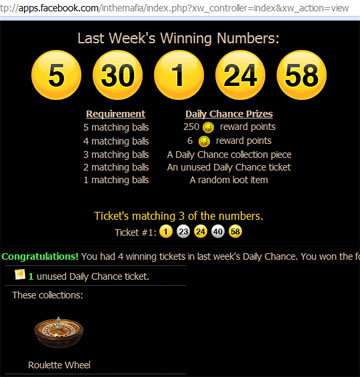 Wheeling and dealing Twin Buns: "I think you're assuming that he gets a different piece each time he wins one, Puffy. By my calculations, there's about a 0.6% chance of that happening." [Ed: Sheeeeeeeet] Quadruplet Cheese Buns: "Not bad, but four heads are still better than two." Quintuplet Buns: "Are we done here, the pay is pathetic when split five ways." Split Bun: "Nearly there, let me just announce his Sevendaily Challenge, currently at $829/$800. Nothing very interesting this week, with Sunderland perhaps the best bet:" $50 on Sunderland to beat West Ham (at 1.85) $50 on Liverpool to beat Fulham (1.75) [Mr. Ham: Oei!] Bag of Biscuits: "Before anybody asks, I'm not a bun, I'm just here for the fun. Special mentions to the unbelievable Stephen Wiltshire, and last but not least our very own Local Legend, in a meeting of laureates."
- + hamsters -  It's tough being a hamster nowadays. It's tough being a hamster nowadays.At an age where I should be entitled to be gainlessly unemployed, peacefully whiling away the hours licking my own limbs and combing the fur on my handsome head, Mister Human Boss comes in and sticks a couple of articles up my dainty nose. "Why can't you be like some of your African giant pouched rat cousins, huh?" the two-legged tyro sneers. "And get your lazy ass down to Mozambique and help clear land mines. Be a HeroRAT!" "Or maybe at least earn your keep the hard way. This British rat competes for his food with a bleeding leopard!" the know-it-all continues. "The most you've done is turn down sunflower seeds for honey stars all the time you've been here." Philistine! I was gracious enough not to recriminate on the matter of the substandard fare served up, and he pours salt into the wound with his accusations. Mind, not that there are ever any condiments around to hide the blandness. It is exactly this sort of manager that destroys enterprises with their soulless fat-cutting layoffs. I have already lost half an ounce in the last few months - what more does he expect? I am half tempted to jump ship and link up with Mr. Fish in the world beyond - though he's a pain in whichever body part he bites, at least he'll look out for a fellow hamster. I hear he's landed a sweet gig promoting the use of the new variable, the ham, in asymptotic analysis.  The future of computing While superficially it appears like the three Latin letters h, a and m together, it really is a single character, the ham. Yes, it is not very convenient to write, but since when has that stopped scientists from using the Greek alphabet? Some recognition for rodentkind is long overdue - the combined contribution of lab mice must overwhelm that of any single human - and we're not too picky, we will share the honour if need be. I don't know, maybe with Dr. Richard W. Hamming, whom the Hamming Code was named after? Mr. Fish admits that the outrageously human-centric scientific establishment has given his lobby short shrift thus far, not even admitting him the dignity of a reply. Typical of those arrogantly evolved apes. No matter; plans are underhindpaw to declare the official shortfrontpaw form of the ham as the English letter n. Let the humans sweat over that! Making Mister Human Boss's criticism even more untimely is his undeserved luck in his pretend football betting in recent weeks. I commiserate with Liverpool fans in their valiant efforts to expose the massive conspiracy in the English Premier League; a quick peek at the table shows that four of the five ham-teams (my beloved Full Ham, Birmingham, Wolverhampton and West Ham) are languishing in the bottom half, with just Tottenham bucking the trend (and we all know they'll magically find some way to mess up. In fact, they've already started by losing to Stoke yesterday). There is some favouritism going on, mark my words, and it seems the hams are getting the worst of it, yet again! Is there no end to this deplorable speciesism? Profiteers like Mister Human Boss are the only ones who benefit, as he did when he backed Tottenham to beat Portsmouth, then dropped them like a hot potato. $829/$700 already, and he ducked a lot of upsets yesterday. How fortunate of him. $50 on United to beat Liverpool (at 2.23) - awfully generous odds even if form goes out of the window. N.B. the odds at Singapore Pools dropped to 2.10 for a time, but moved back to 2.22 as of time of blog post publication N.B.N.B. That's responsible diligent hamster research for you! $50 on Arsenal to beat West Ham (1.40) - simple enough, given that its against a ham. Hmph
Another day, another assignment completed, another (mostly) random topic. After discovering that this blog has been inadvertently shilling for a book by the founder of Scientology, thanks to the wisdom of Google AdSense, it seemed apropos to list out some of the advertising-related items of interest that I've come across lately (not that I'll try to block that ad, disagree but defend right to say [and pay] yadda yadda). Ads Alright, first up, Yahoo! Singapore at the ITE Dover bus-stop (opposite the NUS track): 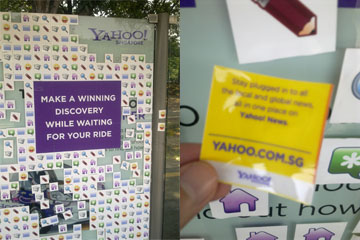 Revealing campaign Chalk one up for participation, even if I didn't kope one of those squares of plastic in the end. A neat idea all-in-all. Following that, 137infinity.sg . They had rather heavily saturated the local online adspace, to the extent that they even showed up on the Garena client. Was it a music album, a movie, or an online game (in their own words)? No, it's Singapore's very own third-generation army (and navy, and air force)! 1 SAF, 3 Career Schemes, 7 Core Values, Infinite Possibilities! Reminds me of ditloids: Quick, what does 52 C in a P (W J) mean? Not signing on anytime soon. Moving slighty further afield, Facebook popped up with this beauty, for O'Bama's Irish Sandwich Bar, and yes, Obama does have Irish ancestry. Is there any way he could be more cosmopolitan than he already is? He does have a freakishly universal smile, for one, and it may yet be prudent to judge a man by his face. On an even more global scale, the Catholic church is making it easier for Anglicans to convert (wait, aren't they of the same flock? Well, not quite it seems). True, this isn't profane, material advertising, but (cough) if one isn't pleased with women and gays playing larger roles, for which they are eminently not meant to fill (cough), well, do we have an offer! Lib Among this trip's selection was University Inc: The Corporate Corruption of Higher Education by Jennifer Washburn. Easier to summarize than most, the book is essentially one example after another of how money is influencing universities. In truth, money does influence many things, but many do believe in the ideal of college being where badly-dressed academics can argue wholeheartedly about the finer points of some abstract theory that is of little practical significance, without filthy lucre polluting their immaculate and vigorous debates. Well, in the fields where the "little practical significance" part holds true, if only in the immediate and monetary sense (i.e. most of the liberal arts, and perhaps pure mathematics), the academics are mostly untouched; but where big bucks come in, most noticeably in biotech where a successful new drug can earn hundreds of millions, but also in other areas of science and engineering, money talks in their labs and lecture halls. Loudly. The condensed liturgy of ills is more or less this: A star professor is hired, on the condition that he doesn't have to teach too many sniveling undergraduates, so that he can focus on research, which is what brings in grant money and gains prestige. Actually, this is not bad in itself, since in reality many graduate students might be competent in tutoring the average undergrad in Calculus 101, but not many can create new theories and push the boundaries of human knowledge. (Of course, this is the worst case - some great researchers also love to teach) The professor then sets up a lab with the money, which may come from benefactors and the government (as is traditional) and students (whose rising tuition fees show no sign of slowing), but increasingly from private industry as well. He who pays the piper calls the tune, and the companies have, among other things, been known to set directions for research, prod researchers towards favourable (and dishonest) outcomes, claim ownership and patents on the results (despite being partially publicly funded!) and disallow publication and sharing of new knowledge, which is just about the antithesis of what being an academic is supposed to be. Universities haven't been shy about getting into the act either, and they have been known to invest heavily in start-up companies run by professors and alumni, sometimes hitting the jackpot (as Stanford did, with a near US$200 million windfall from Google back in 2004). Again, it is unclear if institutions that are supposed to be impartial in the pursuit of truth should be doing this, but with endowment, facilities, quality of personnel and status going hand in hand, the attraction of a solid financial base is palpable. What is startling is that the list of the accused reads like a survey of America's top universities, but when reconsidered, that only makes sense; If outside investors want to get rich from innovation, would they approach an average state community college, or go direct to the pillars of the establishment, the Harvards, Yales and Princetons? Though not the primary focus of the book, there are some observation on the implications of rankings, with gaming the U.S. News & World Report being widespread (the tongue-in-cheek University of Poppleton being a recent winner). Where does all this leave me, as a newly-minted graduate student? First, I'll need to have some cash thrown my way. Joking aside, I've always leant towards applied research - not for me the elevated sensibilities of G.H. Hardy and the like. I'll cross bridges when I get to them. A Final Note It has come as something of a dismay that a number of my acquaintances have been deleting, password-protecting, hiding, or simply letting their blogs die a lingering death. Come on, people, is the going that bad? Let free expression live! (Disclaimer: If someday, any of you get into trouble with your significant other/social circle/boss/colleague/constituents for something in your blog, remember, you wrote it. It had nothing to do with me.)
- + epl tales -  Figured out how to continue on one of my ongoing module projects, so I thought I might relax a bit with a spot of comic-creating. Fair play to Benitez for not kicking up a fuss this time, even if he might have had a case. And yes, it was that funny.
...in installations. Faced with the need to use ImageMagick, I wasn't too bothered since I had used it as recently as last December, but oh wait, my computer had conked out in March. The package from the official site didn't work out, and it took a couple hours of Googling and fuming before I discovered the fix - just upgrade the ActivePerl version from 5.8 to 5.10. This sort of open-ended complication would be rather more stressful if it didn't at least admit a (rather forced) pun on the previous blog entry title. They say that a bun is the lowest form of wheat; still, it's filling and nutritious:  "A bun? Goodness me, we're not buns. Right, Lou?" "Not at all, I'm wide-eyed with astonishment!" "Oh hai, didn't see you back there." (Source: Momongas courtesy of Cute Overload) Ahem. On the last post on cheap, we have an affirmation by none other than our local labour chief and NTUC secretary-general: "Cheaper, better and faster is the answer"! This was not taken well by some netizens, with one of them sagely bringing up the Project Triangle, which states that one can only achieve two of the three qualities of Good/Fast/Cheap at any one time. Unfortunately, it looks like there won't be any "we'll pay you ten cents to take another bottle of 100 Plus" offers in international economics, though that did happen in my last badminton session (skipped latest one due to tiredness). The EPL returns, and this week, with the virtual balance at $664/$600, the pick is: $100 on Tottenham to beat Portsmouth (at 1.65) - Pompey beat Wolves, but Spurs are a class above
- reviews - - William Safire, RIP 27 September 2009 Safire's nugget of wisdom was subtly stressed in several of the books I picked, from two brief stopovers at the regional library. Without further ado, and ignoring Safire's admonition to "Last, but not least, avoid cliches like the plague", let me not beat about the bush and cut to the chase. In alphabetical order, the books are:
Among these, the Web 2.0 and Parker Brothers studies are slightly less congruent to the others, with the former fixated on the present and future - a nineteen year-old Harvard sophomore starting on the road to creating Facebook after getting dumped by a girl, for instance (around the same time I was in NS, come to think of it). It was too painful to read too many stories about what I might have at least attempted, and so I stopped reading it after a while. On to the Parker Brothers and gaming then. Apparently, games in the nineteenth century were supposed to promote morality (e.g. The Mansion of Happiness), which must have worn thin after awhile. In came George Parker, who read the trends and came up with games on more unprincipled themes, such as Banking. Not that he was too averse to playing the morality card, as he did when he introduced Rook, which is essentially a normal deck of playing cards except that it was not descended from the Tarot and thus, you know, ungodly. Parker Brothers is probably known today for evergreen hits like Monopoly (since 1935) and Risk (originally La Conquete Du Monde, introduced 1957), and less for oldies like tiddly winks (in the 1890s), or the card games Pit (1903, million-unit seller) and Flinch (1905, even more popular than Pit). Simplicity seems a top selling point, with Pillow-Dex (1896) simply indoor volleyball with a balloon, and later the Nerf ball (1970), which did not even bother to have any rules. Pillow-Dex was in fact a precursor of Ping-Pong (1902), where Parker Brothers capitalized on the invention of celluloid (originally meant to replace billiard balls) and organized the American Ping-Pong Association and Parker Cup competition, but were unable to stop the generic table tennis from becoming widespread. Another revelation was that Mahjong was once a big fad in America from 1922 to about 1929, with Parker Brothers' exports of Mah-Jongg sets from Shanghai making up the sixth highest-valued category of Chinese exports to the States then. A common complaint then was that everyone had their own way of playing the game (which Parker Brothers tried to standardize), a sentiment which I can share. On (human, not computer) networking next, author Ivan Misner, Ph.D. insists that no, it is not a fad (he's also the founder of Business Network International, a business referral organization, so...) There are dozens of subsidiary facts in the book, and I'll just draw attention to the most striking ones. Heading the list is that bad referrals are in practice far more common than good - a hundred happy customers may not so much as whisper about your excellent service, but that one demanding and totally unreasonable customer often finds the energy to fling a lot of crap. Along the same line, people who like, care about, and/or respect a person, nevertheless almost never refer business to him - when was the last time you name-dropped for a relative or a friend? Indeed, it is later on stated that being plain nice and helping others out won't get referrals either, and that it is best not to expect reciprocal referrals, but to give them unconditionally. Of course, to help oneself, it is advised to "...choose your relationships wisely. Form relationships with people who are willing to practice the philosophy of giving unconditionally", so your goodwill won't disappear into an unending void, I figure. Statements of this sort do make me a teeny bit uneasy, since it makes the act of forming and keeping friendships seem calculated, i.e. friends for benefits. Misner does at least warn against putting people down based on appearance, since "you don't know who they know", but this does seem to imply that if they really don't know anybody, it's alright to brush them off then. Well, this is life (and business) after all, and one can't meaningfully give attention to everybody. A couple more tips: Ask direct questions such as "Do you know of any art teacher..." instead of "Do you know of anyone who might need art supplies...", since it is far easier for others to make simple connections, and try to practice the Platinum Rule instead of the Golden Rule: "Treat others the way they (and not you) would want to be treated." (there's often a difference) Emotionomics follows up on Malcolm Gladwell's Blink, and declares that humans are primarily emotional (instead of rational) decision makers. The third page probably sums it up with a J.P. Morgan quote: "A man makes a decision for two reasons - the good reason and the real reason." While people often do not reveal their true feelings in speech, whether out of politeness or deceit, it appears far more difficult to hide their instinctive facial expressions, which seems inborn as even blind people exhibit the same responses. Ekman and Friesen's research on facial coding supports seven major emotions, namely surprise, fear, anger, sadness, disgust, contempt and happiness (which is the only truly positive emotion, and even then people often have to try and fake it with a "social" smile). If facial coding is accurate, then the actual public sentiment towards issues may be pretty far removed from what is expressed during spoken or written polls, e.g. racism (5% spoken, 43% facial) and sexism (11% spoken, 40% facial). Huntington's opus The Clash of Civilizations and the Remaking of World Order was cited as defining certain values that companies aspiring to a global reach have to be careful about. One interesting example: White Democrats were rather more positive in their facial responses to assistance offered to a black family as compared to a white one, while it was the opposite for white Republicans. While there's a lot after this, it mostly seems to come down to emotions and the subconscious being the first barrier anybody seeking to influence has to get through (Kahneman and Smith won the 2002 Nobel in Economics for more or less emphasizing that). The beginning of the book gives as an example people being most accepting of a mid-priced product ($6 compared to $5 and $7) at least emotionally, probably because it wouldn't make them feel as if they were being ripped off, but also that they weren't cheap. But the last two books to be covered - Cheap and The Bully of Bentonville - suggest that cheap is winning by a landslide. The first book is a more generic view of the phenomenon, while the second focuses on the Champion of Cheap, Wal-Mart, but both extensively cover that kingdom built on "Everyday Low Prices"; and they don't come much bigger than that. Tech companies like Apple, Google, Microsoft and IBM may be more glamorous, but Wal-mart dwarfs them in most measures (e.g. revenue, asset worth, employee count). More statistics to rub it in - If Wal-Mart were a country, it would be the 21st largest in the world by GDP, and China's eighth largest trading partner. Even by data capacity, it has 460 terabytes in its data warehouse, compared to Amazon.com's mere 13 terabytes, and which could store half the Internet (figures for 2004 - the Internet's size is estimated to be closer to 5 million terabytes now). Cheap covers the rise of "value" and the loss of craftsmanship from the replaceable parts innovation in firearms way back in the eighteenth century, and lists the psychological tricks employed by large discount retailers (synonymous with cheap) throughout. [See the Dilbert take on processes] We all know (and still get taken in by) the artificial marking-up of prices before they are heavily discounted, of course. What may be less well-known is the degree to which this can be orchestrated, an example being rotating discount offers through different brands of the same class of product. As Emotionomics also stresses, establishing product quality (branding) is very helpful, since then a reduction on price is attractive to customers, whereas low prices on products of doubtful pedigree is often seen as a reflection of low quality. One possible signal mentioned was situating oneself in a place linked to premium brands to enjoy class by association. Another of the more amusing Jedi mind-games was utilized by a company that had a poor response to the now-ubiquitous shopping carts, as men thought that they were effeminate, and women thought that they were insulting (shrug). Solution: hire burly men and attractive women to pose as customers using the carts. This sort of peer influence works more often than it should, with the White Castle burger chain once hiring guys to dress up as doctors and eat their burgers to successfully lend the impression that they were healthy. This aside, the books agree that the ability to be cheap to consumers is built upon one necessary constant - the ability to be cheap to employees. Frank Woolworth, a pioneer of cheap retail, recognized it early: "We must have cheap labor or we cannot sell cheap goods. When a clerk gets so good she can earn better wages elsewhere, let her go." Ordinary employees can get rich - but they had to be with the company from its founding days. (Note that this is not always true, and the Web 2.0 book gives instances where recapitalization of a startup led to original investors being left with next to nothing) It was also asserted that in the case of Wal-Mart, other than being lowly paid (which to be fair is par for the industry), workers get poor medical benefits, do unpaid overtime (which in the case of salaried and not hourly-rated employees is legal), work through breaks, have personal relationships scrutinized, and still have to do a Wal-Mart cheer each morning. Employee turnover is naturally high, with nearly half of the hourly-rated employees leaving annually. Keeping in mind that this is a negative portrayal, the authors list out their grievances against Wal-Mart (and by association, other companies of the ilk): Their supersized stores squeeze traditional independent mom-and-pop stores out of existence, but are still able to force communities to offer concessions and incentives to host them, since the consequences of losing out to a neighbouring town are even worse. On the supply side, the concentrated power of such a huge retailer can extract extremely favourable terms from manufacturers. One case study is Vlasic Foods, whose quality pickles Wal-Mart flogged at a minute profit margin, which contributed to the company eventually filing for bankruptcy protection. Yes, Vlasic might have refused to do business with Wal-Mart - but how then could it sell its product? Ditto for Huffy Corp, a bicycle manufacturer that once owned the biggest bicycle factory in the world in Ohio. Wal-Mart could order nearly a million bicycles at a go, but on the condition of - what else - drastically reduced prices. Huffy couldn't make the numbers add up, saw no option but to outsource to China, but still went under and got acquired by the Shenzhen Bo-An Bike Company. To further put Wal-Mart's dominance into context, consider Proctor & Gamble, a behemoth in its own right and almost certainly within the top dozen largest corporations in the world. Yet, P&G's products only account for 2% of Wal-Mart's sales, while Wal-Mart accounts for 18% of P&G's revenues. In short, Wal-Mart can hurt even one of the biggest manufacturers, far more than they can possibly hurt Wal-Mart back. What hope then for smaller producers? Not that many consumers might care. They want low prices, and Wal-Mart delivers (on easily compared signpost items, at least). Manufacturers and labour unions (which Wal-Mart takes great pains to eradicate from its operations) can go cry in a bucket. There's always some honest, hardworking chap in China or India who'll take their jobs for half their wages, or in other words, at the China price. The other side of the story is then, what's wrong with the China price? Yes, their benefits and working conditions are bad, and the product not particularly fine, but isn't that what capitalism is all about, with consumers voting with their wallets? A cheap Billy bookcase that sags when loaded is disparaged, and a durable (and expensive) one lauded, but can they be compared? As Jonze says in his Ikea ad: "Why do you feel bad for this lamp? That is because you are crazy! It has no feelings, and the new one is much better!"
- Mr. Eugene Kaspersky, getting it right from the start  No, Jackie Chan didn't visit too (sadly) Unscheduled update here on Tuesday's talk, "Taking Responsibility For The Internet" by the Eugene Kaspersky of Kaspersky Anti-Virus (KAV) fame (personally haven't tried it though). I haven't attended too many such events in my time at college, therefore once I got wind that it was just before the algorithms lecture anyway, I decided to be a good academic citizen and sit in. Mr. Kaspersky began by identifying four classes of people: Victims (i.e. us), E-criminals who seek to prey on the victims, the IT Threat protection (ITTP) industry which tries to shield the victims from attack, and the police, with whom the ITTP cooperates with, and who nab the E-criminals. Now, so says Mr. Kaspersky, the reason that E-criminals can thrive is because modern operating systems are flexible but insecure. Secure OS-es, like Symbian 9 and BREW, combat malware by demanding that all software developers get their applications certified. Of course, the trade-off is the cost of certification and the delays involved in bureaucracy. It then comes down to what developers and users value most - flexibility (and convenience) or security. Apparent system slowdowns from resident protection and time-consuming scans aside, the balance is tilted towards the former from past experience, with Novell Netware's decline cited as an example of the perils of neglecting the software community. It was suggested that iPhone/Blackberry's intransigence in this respect may yet prove fatal against Windows Mobile/Google Android's more permissive policies. This is all the more likely as operating systems are expected to become near-homogeneous in coming decades as the industry matures, with Mr. Kaspersky showing near-indistinguishable screenshots of Windows/Mac OS/some Linux GUI for emphasis. A historical parallel was drawn with automobiles, with the Ford Model T being dominant 70 years ago, but with dozens of functionally near-identical brands nowadays. Bad news for security buffs, but likely good news for Kaspersky Labs in business terms. The next visionary insight was on the rise of smartphones, as computing power shrinks into ever-smaller packages, such that in twenty years, our basic computer may well be a handphone, with dumb terminals consisting of just a monitor, keyboard and mouse provided for us to plug our phones into (seems more viable than pure cloud computing to me; I also doubt that netbook-equivalents will die, at least until holographic projection technology arrives, as we have probably reached the practical human limit for miniaturization - how much smaller can they make buttons and screens before the device becomes unusable?). Of course, the malware problem will follow wherever computers go, as Mr. Kaspersky illustrated magnificently with several examples: 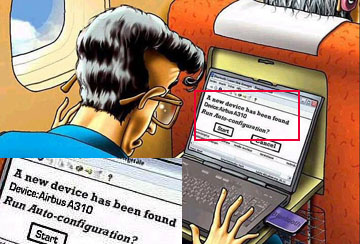 Downloading new device drivers from Windows Update... (Source: Communications blog by Brough Turner) And what is the motivation? Long ago, virus authors were mainly young lads who couldn't get laid on a lazy Saturday night flexing their l337 skillz for cred and kicks. Nowadays, such innocence is no more, and it's all about the money. This new breed of hackers might reprogram exchange rates to extract cash from ATMs (or use cloned cards, which has happened in Singapore), or even just send out a bazillion spam emails (which does earn big, say over US$200000 a year, conservatively). N.B. The Facebook Mobile Web spammers could have just inquired on rights to my status update, I'm sure we could have worked something out... In this, Mr. Kaspersky reveals that the criminals help (and compete with) each other, in what he terms C2C: Criminal-to-Criminal. For instance, if some well-funded nationalistic organization needs a botnet to shut down some other country's government sites with a denial of service attack, it does not need to go through the trouble of building one of its own. It can just rent botnet time from a botnet provider, which may provide terms of service and offer technical support like any legit company! Sidetrack: Mr. Kaspersky notes that cybercrime has no known links to traditional organized crime yet, but what with the recession and even the Yakuza introducing pen-and-paper exams, I would venture that this might not hold for long. This is furthermore sad news for the less academically-inclined, who may have felt that a devotion to the principles of brudderhood, and no particular affection for random fingers, would surely earn them a rewarding career as a big-shot gangster. No escape for those who got "destroyed" by the PSLE Maths paper, then. A more visible instance of cybercrime would be something like the mass blackouts in several Canadian and American cities back in 2003, which coincided with the Blaster worm outbreak (one variant created by a bored 18 year-old). Officially, it was denied to be the cause, but in theory, it might well have been. On to the solutions, and the bad news is that some attacks, such as distributed denial of service, are impossible to really protect against, though some measures may be taken. This is a consequence of the design of the Internet itself, which Mr. Kaspersky asserts, is wrong. He reasons as such: the Internet is just another public network, such as the transportation, electricity, water or financial (ahem) ones, which all have their own regulations and policing. Why not for the Internet, then? The key issue, Mr. Kaspersky says, is anonymity. This might be discontinued by, among other requirements, allowing only trusted applications to run, assigning Internet passports (reminds me of Windows Live ID's ill-fated former name) to individuals and demanding accreditation for businesses, and mandating the temporary storage of requests for possible examination by an Internet Interpol. Certainly, this would halt a lot of the current abuses prevalent on the Internet now. There would be no more malware, no more unsolicited spam, no more illegal activities like filesharing (perhaps not a particularly popular consequence), and no more organized crime using the Internet for communications. If extended to the degree that people have to reveal their passport (and thus real identities) in discourse, I would expect that many flamers and griefers who troll messageboards would quickly self-moderate their behaviour. 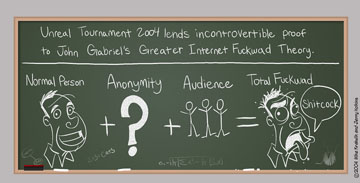 Empirically verified in DotA games! (Source: Penny Arcade) However, I think that this is at its heart a philosophical and not a technological problem, and Benjamin Franklin's famous quote springs easily to mind: "They who can give up essential liberty to obtain a little temporary safety, deserve neither liberty nor safety." In practice, it is very possible for OS developers and hardware manufacturers to produce components that require all applications to have valid cryptographic keys to operate, and for authorities to implement protocols that require very strict end-user authentication. Not easy, but completely possible. Before we proceed, it should be mentioned that right now, the average user actually has next to no privacy where the Internet is concerned, anyway; It is almost a given that his ISP would have a record of all websites or services he has visited, at least recently, and any savvy E-criminal could gain access to such information by sneaking malware onto that computer. Indeed, some ISPs, much less countries, are already staking their claim to possibly control what users can or can not see on the Internet. But the reworking of the Internet, if it comes, would still be highly symbolic. What it would express is that some authority, somewhere, has the right to monitor any individual (right now, sufficiently smart or determined users can cover their tracks to a large extent). This is analogous to most decent citizens having nothing much to hide, but still being understandably unwilling to have their private mail correspondence read, or homes searched in absentia, at whim. Quis custodiet ipsos custodes etc etc. There are already moves in this respect in regard to intellectual property (see Richard Stallman's "Right to Read" take on schemes such as Microsoft's Palladium initiative) Thus a tenuous balance prevails between security and irresponsibility, or freedom and tyranny, depending on who you speak to. Mr. Kaspersky by all accounts wants more security and order. Others like Mr. Stallman desire liberty or death. Maybe there is some ingenious third way that preserves both security and liberty, such as Ron Rivest's fascinating ThreeBallot voting system that claims to provide both verifiability and anonymity, previously thought to be an incompatible combination (which actually, it may well remain). I won't be holding my breath on that, though. Mr. Kaspersky correctly identifies when the balance might be tilted in favour of security - after a massive cyberterrorism attack that creates perhaps a widespread blackout, or even a nuclear plant meltdown; observe how quick Americans were to sign away many of their civil liberties (see the Patriot Act) after 9/11. So, are Mr. Kaspersky's views right? Evidently, he strongly believes so. There are the people who, upon seeing a wallet upon the ground, will pick it up and ask whose it is. Then there are the people who will pocket it, and the people who will actively strive to get wallets out of others' pockets. Mr. Kaspersky self-identifies with the first kind of person, and one can do no more than strive to do what one thinks is correct. Good luck to him, then. He'll at least have Jackie Chan by his side, and from all those New Year action movies, those are good odds.
I had thought that NUS eLearning week was a great opportunity to get ahead of work. Well, I kept abreast, but that's about it. Realised that I had turned down, directly or indirectly, quite a few offers to build systems in the meantime. Perhaps I should find a way to near-automate the process? Continuing on NUS, it has maintained its position as Top 30 in the world from last year, though it has dropped a few places from eleventh to fourteenth in engineering and information technology. There doesn't seem to be as much hoo-hah in the local news as in previous years. But come on; it's still better than, among others, UCLA, Berkeley, UIUC, Dartmouth and Purdue, or so THES says. The Straits Times did have something to say on the matter of rankings, concerning another of Singapore's elite institutions, Changi Airport. Apparently, Changi slid to third, after finishing second for the past two years, and first in 2006. Hong Kong International Airport was second, and frankly from my stopover there, it was there or thereabouts. As quick as you please, the national newspaper comments "Should we even be paying attention to such rankings and surveys?", "Airport polls and surveys... are a dime a dozen", "The bottom line is that there is no perfect survey or ranking method", and the real kicker: "Theoretically, there is also nothing to stop an airport from actively encouraging employees and travellers to submit feedback..." (ahem) ...And of course, the official Changi Airport website proudly maintains a page dedicated to these dime a dozen, perhaps unworthy-of-attention awards (or perhaps these are the proper sort that don't list the airport as second or third). Furthermore, had Skytrax put us first, I have my suspicions that the editorial would instead have been about how renowned the award is, with "...more than 8.6 million travellers from over 95 nationalities around the world..." participating (as lifted from Skytrax's website) Well, come on now. Yes, what the editorial says is in fact true, but trotting it out only when the results aren't in one's favour seems a bit petty. Third or thirtieth, it's not bad lah. To cheer our wounded airport-and-educationistas, I'll plaster one of the funnier comic strips I've come across on the net these few days, right here:  (Source: Studs Up by Chris Toy) And there's another one on the Nobel Peace Prize winning the Obama... oops, Obama winning the Nobel Peace Prize. The world may be trying too hard to make it up to Obama after they cruelly kicked Chicago's 2016 Olympics bid out in the first round of bidding, despite POTUS turning up in person to make a speech. How could they! No EPL this week as World Cup qualifiers commence, but a significant announcement about its fate in Singapore was made by the SingTel division of TH. They will charge S$23 (before GST) for all EPL matches, without the need for a basic package, while the Starhub division of TH for its part will allow early termination for subscribers, without penalty. Thus, we are back to where we started at, with an additional set-top box and remote control and possible signal interference from the phone line. I'm not completely thrilled at the convenience, but at least it appears that total cost won't rise much (yet) since Starhub will probably have to drastically cut its sports package price. New managerial economics case study in the making. Coming some time after the Google book review... Gmail data is not bulletproof, gasp. In particular, if a careless bank employee emails sensitive data to you, a judge can order your account deactivated although it really has nothing to do with you. Which makes completely no sense whatsoever. Will have to archive my Gmail messages, then. Thoughts on the most recently loaned books to follow. No idea how I managed to ignore the non-fiction section for so long - Wikipedia and the internet? There's still no substitute for a well-researched tome, I would say.
Completed my Computer Vision assignment ten days in advance, which might be a record. Mechanically applying the Gram-Schmidt process, then solving simultaneous linear equations to transform bases, was a pain, and I really hope that this sort of questions doesn't come out for the exams; I've never been particularly quick in plowing through numerical manipulations (which computers are around for), but it's win some, lose some. The stitching of images together in MATLAB part (i.e. image mosaicking) was more fun, though the little bugs like neglecting the normalizing influence of the third element in the coordinate vector, stupidly using the uint8 data type that allows only integers from 0 to 255 for values that were much larger, and forgetting that MATLAB represents image data as matrices, thus a row times column array instead of the more conventional width by height format, were frustrating. Oh, and edchong introduced a paper that says that functional magnetic resonance imaging can be used to reconstruct natural images, or in tabloid terms, "Scientists Discover Mind Reading Device" - at least that's what I got from the paper summary (will read the thing someday). It's Bayesian Reconstruction of Natural Images from Human Brain Activity by Naselaris et al., for those itching to look at it themselves. Continuing with worthy research, the 2009 Ig Nobel prizes are out! Dearest to my own heart is the work of Medicine Prize winner Dr. Unger, who demonstrated by extremely lengthy experimentation that knuckle cracking does not cause arthritis of the fingers. To support his claim, he cracked the fingers of his left hand daily, and never cracked the fingers of his right hand, for a period of sixty years. Take that, anti-crackers! Hamilton won the Singapore Grand Prix, probably to the delight of smk, but for better or worse all the pre-race talk was dominated by the Crashgate scandal, where Nelson Piquet Jr. purposely crashed his car to hand an advantage to teammate Fernando Alonso, who won. Some were concerned that the incident would tarnish local reputation; well, this is SIN city after all, but more seriously, the matter obviously had nothing to do with the race organizers. The biggest sports shock to me was the capture of the EPL screening rights for the next three seasons by SingTel's mio TV, along with ESPN and Star Sports. The Today paper kindly provided comprehensive details of the sports split by mid-2010:
You know, if I were a more cynical fellow, I would say that this distribution practically forces sport fanatics to subscribe to both services. Wanna follow Federer? He's on SCV for the US Open, mio for Wimbledon. Tiger Woods? SCV for the PGA Tour, mio for Augusta. Like both American football and baseball? Why, SCV-plus-mio will cover it all! Bundling is one thing - what if a person just wants the local channels and the EPL/CL (a not-insignificant proportion of the viewership, methinks)? Can't be done, SCV says you need a minimum of three Basic Groups, which comes to a minimum of twelve channels, none of which our hypothetical EPL fan might have the slightest interest in, for S$25+/month, to begin with. Only then can they consider letting him have the add-on Sports group, again with a bunch of random sports he might not care about thrown in, for S$26+/month. Fair enough - or maybe not. But hey, competition will help the little guys like him, no? Enter mio TV, which starts its assistance by bidding for and winning the Champions League rights, such that our little guy now has even less of the content he wants on SCV, who of course aren't going to offer a refund or moderate their price. Finally, the "consumer-wins" competition cumulates in a nice split of the available programmes as seen above, such that the little guy effectively has to pay about twice as much, just to get what he had been getting before competition. He wins! Of course, sports is not an essential good (well, close to), so as with all such commodities, it can be argued that a company is well within its rights to maximize profits, whether by bundling or raising prices to what the market will bear. If the fans scream blue murder but end up biting the bullet and forking out the cash, it only proves that they (the companies, not the fans) were right. We are a capitalistic society, remember? 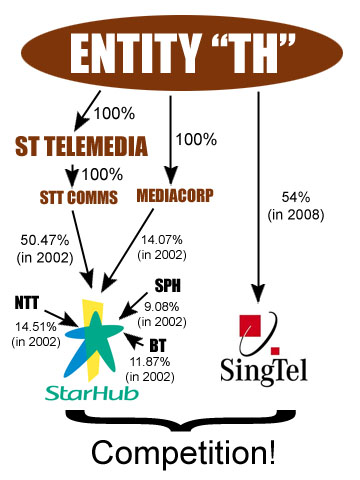 The strange realities of competition (Sources: Wikipedia, Findarticles, ZDNet Asia) [The figures for StarHub are slightly outdated, with Qatar Telecom getting a stake, but the big picture probably remains the same] Returning to the subject of the not-long-for-my-SCV-subscription EPL... Edited footage of the Downfall movie has been floating about for ages, but this particular one on the Manchester derby is too class to ignore: Too many Nazi references in recent posts, Godwin-ed? Oh dear. Then again, perhaps other than defined facts, the probability of anything happening approaches 1 as time passed approaches infinity, so Godwin's Law may just a trivial specialization. At a very healthy $664/$550 for the $100 Challenge. Pompey appear to be winning at Wolves as I type this, which is fortunate since I was tempted to back Wolves against them. Spurs meanwhile are getting pegged back by Bolton, another outcome I could not have foreseen. Well, there's always United, even at short odds: $50 on Man United to beat Sunderland (at 1.18)
|
||||||||||||||||||||||||||||||||||||||||||||||||||||||||||
 Copyright © 2006-2025 GLYS. All Rights Reserved. |
||||||||||||||||||||||||||||||||||||||||||||||||||||||||||